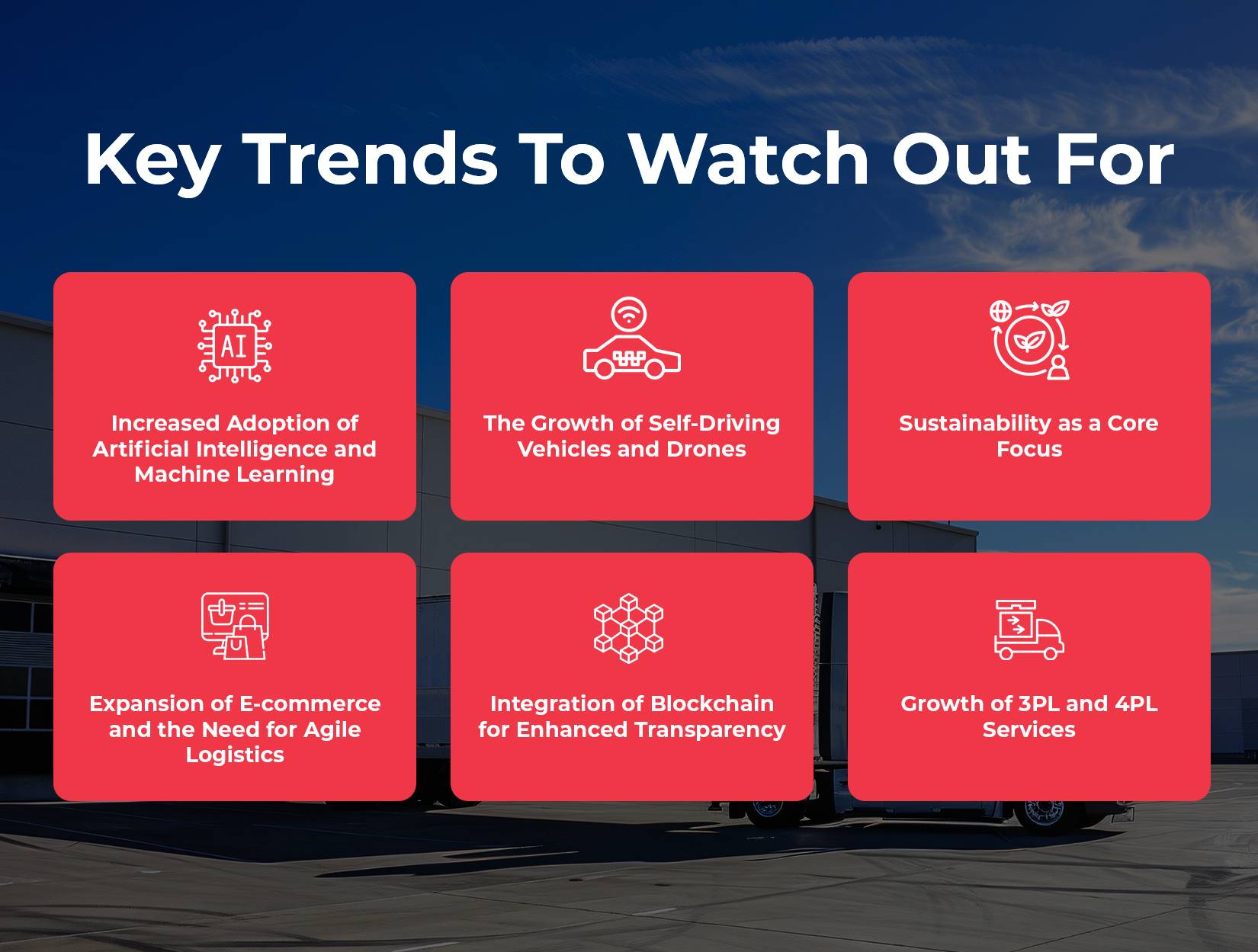
Top Trends Shaping Logistics Management in 2024: What to Watch
The logistics industry is undergoing significant transformation, driven by technological advancements and changing market demands. To bloom in this age of fierce competition, logistics companies must adapt swiftly to cutting-edge technologies, pioneering processes, and strategic approaches. Research and Markets reports that the market, valued at $9,407.5 billion in 2023, will grow to $15,978.2 billion by 2032, with a compound annual growth rate (CAGR) of 6.4%. Businesses must understand these trends to remain competitive and optimize their operations with the best logistics management software solutions.
In this article, we will cover major logistics trends that leaders are addressing as we navigate 2024:

1. Increased Adoption of Artificial Intelligence and Machine Learning:
Artificial Intelligence (AI) and Machine Learning (ML) are no longer buzzwords—they are now integral to logistic management. These technologies enable companies to predict demand, optimize routes, and reduce operational costs. AI-driven logistics management software forecasts supply chain disruptions, enabling companies to proactively mitigate risks. A recent study reveals that 61% of companies have already implemented AI in their logistics processes, and this number will continue to increase.
2. The Growth of Self-Driving Vehicles and Drones:
Autonomous vehicles and drones are set to revolutionize logistics management. These technologies promise faster delivery times and reduced labor costs, making them attractive for businesses. Autonomous trucks, for example, can operate around the clock without the need for breaks, significantly improving delivery efficiency. In urban areas, drones are being tested for last-mile deliveries, especially in congested cities where traditional vehicles struggle. This shift requires robust logistic management solutions to handle the complexity of integrating these new technologies into existing operations.
3. Sustainability as a Core Focus:
Sustainability is no longer a secondary concern; it is becoming a core focus in logistics management. Companies are under increasing pressure from consumers and regulators to reduce their carbon footprint. In response, many are adopting green logistics strategies, such as optimizing delivery routes to reduce fuel consumption or investing in electric vehicles. Top logistics software tracks environmental impact, enabling data-driven decisions to enhance sustainability.
According to a recent report, 85% of logistics companies are planning to increase their investment in sustainable practices by the end of 2024. This trend is driving the demand for logistics software solutions that can support these initiatives, providing a competitive edge to companies that prioritize sustainability.
4. Expansion of E-commerce and the Need for Agile Logistics:
The e-commerce boom shows no signs of slowing down, and with it comes the need for more agile logistics management solutions. Consumers now expect faster delivery times, with many opting for same-day or next-day delivery options. To meet these demands, companies need to leverage software for logistics management that offers real-time tracking, route optimization, and inventory management.
The global e-commerce market is set to reach $6.07 trillion by 2024, putting additional pressure on traditional logistics models. Companies that do not adapt risk falling behind, making the adoption of advanced logistics management software more essential than ever.
5. Integration of Blockchain for Enhanced Transparency:
Blockchain technology is gaining traction in logistics management for its ability to provide transparency and security across the supply chain. By recording every transaction on a decentralized ledger, blockchain ensures that all parties have access to accurate, real-time data. This transparency is particularly valuable in complex supply chains, where multiple stakeholders are involved.
Logistics management solutions incorporating blockchain can help companies reduce fraud, improve traceability, and enhance trust with partners and customers. As a result, experts expect the demand for blockchain-enabled management software to rise significantly in 2024.
6. Growth of 3PL and 4PL Services:
Third-party logistics (3PL) and fourth-party logistics (4PL) providers are becoming increasingly popular as companies seek to outsource their logistics operations to focus on core business activities. These providers offer comprehensive logistics management solutions, including warehousing, transportation, and distribution.
In 2024, the 3PL market is expected to grow by 7.1%, reflecting the increasing reliance on these services. The best logistics software now includes features that allow seamless integration with 3PL and 4PL providers, enabling businesses to manage their entire supply chain from a single platform.
Check-out: What are the Best Logistics Management Software Tools and Techniques?
FAQs
1. What is new in the logistics industry?
The logistics industry is seeing growth in AI-powered automation, advanced route optimization, real-time tracking, and sustainability practices. Innovations include autonomous vehicles, drone deliveries, and blockchain for enhanced transparency and efficiency.
2. What technologies are shaping the future of logistics operations?
The future of logistics is shaped by AI for route optimization, IoT for real-time tracking, blockchain for transparency, autonomous vehicles for efficient deliveries, robotics for warehouse automation, and big data analytics for predictive insights.
3. What are the 5 P’s of logistics?
1. Product
2. Price
3. Place
4. Promotion
5. People
Conclusion
The logistics landscape is evolving rapidly, and companies must stay ahead of the curve to remain competitive. By adopting the latest logistic management solutions, businesses can optimize their operations, reduce costs, and improve customer satisfaction. The trends outlined above highlight the critical areas where logistics management is heading in 2024. Companies that invest in top logistics software, such as LogiNext Solutions, and keep up with these developments will position themselves for success in this dynamic environment.
The future of logistics management is here, and it is being shaped technology, sustainability, and the growing demands of the global market are shaping the future of logistics management. Embracing these changes and leveraging advanced software for logistics management will be key to navigating the challenges and opportunities that lie ahead.
By clicking on the red button below, you are not just selecting the best logistics management software but also safeguarding your business in this overly competitive environment.







@LogiNext